Vegans and vegetarians considering a career in the culinary arts have an extra layer of complexity to navigate as they consider their future path. Can they attend culinary school while sticking to their vegan and vegetarian principles? Or is this type of education simply not an option for them?
Once upon a time, the culinary school options for vegans were limited. But now, there are more options than ever. Learn about being vegan or vegetarian in culinary school, and how to choose the right program for you.
What Are the Differences Between Vegetarian, Vegan, and Plant-Based?
While these three diets often get lumped together, each has a unique definition.
Vegetarian: A diet that includes no meat, but may include animal products like milk and eggs
Vegan: A diet that includes no animal products, including meat, eggs, dairy, and honey
Plant-Based: A diet that prioritizes plant-based ingredients like vegetables, grains, and nuts; may or may not include animal products
What Vegans and Vegetarians Should Know About Culinary Arts Programs
You Can Make Culinary School Fit With Your Values
Before enrolling in culinary school, vegans and vegetarians have to decide what they hope to obtain from their education and how their goals connect to their personal values.
Shane Witters Hicks, a chef and graduate of Auguste Escoffier School of Culinary Arts, had to weigh his vegetarian lifestyle against what he hoped to learn in school and accomplish after he graduated. He decided that during school, he wanted to taste everything. He felt that was the best way to get the most from his education. Plus, he thought that if he wanted to cook plant-based versions of traditional animal-based foods, he should know what the original tasted like.
“If I opened a vegan barbecue restaurant in the future, I wanted to make sure I had tasted and knew how to make the best regular barbecue,” he said. “I think my plant-based cooking would only benefit from that experience. I wanted to know how the world cooks and eats.”*
With that in mind, Shane decided that the benefits to his future cooking were more important than staying vegetarian during his Culinary Arts program at Escoffier.
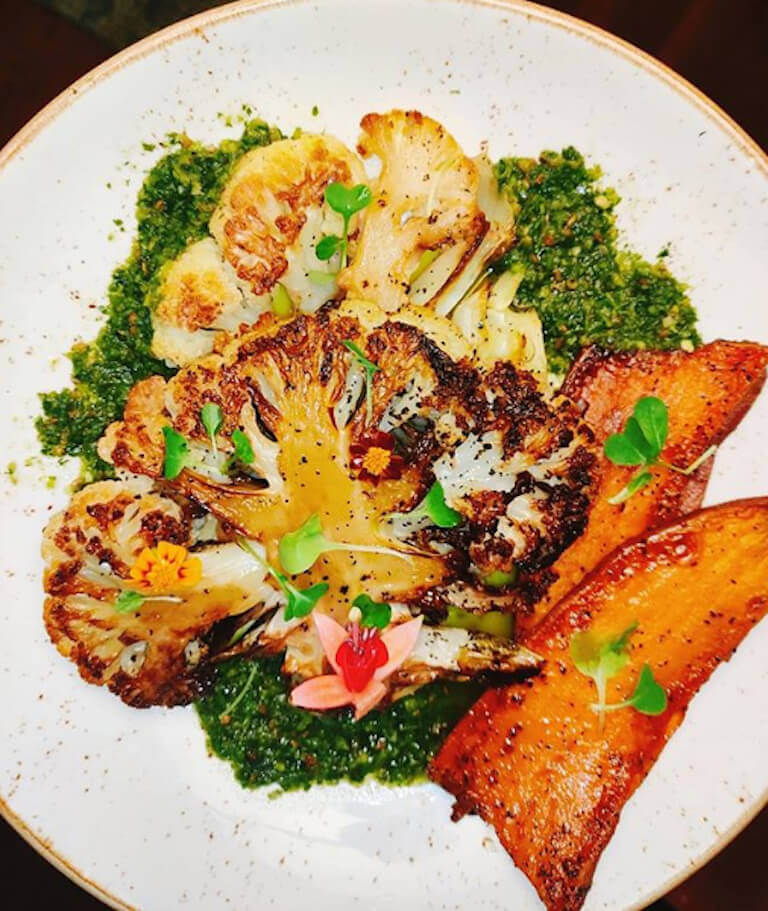
Cauliflower “steak” by Chef Shane Witters Hicks
Still, Shane is adamant that he wouldn’t ever tell anyone else how they should cook or eat. “There are plenty of plant-based cooks who stay that way in school,” he says.
“The more compassion we can have for other people’s way of eating, the better. Going to a traditional culinary school will foster a sense of compassion for how other people like to eat. You’ll only benefit from having that empathy.”*
Shane Witters Hicks, Escoffier Boulder Graduate & Private Chef/Educator, The Soulful Spread
So what is a vegan or vegetarian student to do when the assignment of the day is roast chicken?
You have several choices. You can cook the chicken and taste it, temporarily eschewing your vegan/vegetarian lifestyle. Another option is to have others taste the dish and provide feedback. Or, you can make the dish and rely on your senses of sight, smell, and touch to make sure it’s cooked appropriately. Or perhaps, you employ a combination of the two!
In some ways, honing these alternative senses to assess a dish may be helpful. After all, you can’t taste a restaurant patron’s steak to make sure it’s done correctly!
At Escoffier, Seasonality and Sustainability Are Fundamental
Many vegans and vegetarians have adopted the lifestyle because of its benefits to the planet. Plant-based foods have a climate impact that’s 10 to 50 times less than that of animal products, but the exact impact of each food depends on how it was produced.1
At Escoffier, Culinary Arts students can dig deeper into this food production and its impact on the environment in the Farm to Table® Experience. This course explores seasonality and sustainability in farming and ranching. It also discusses topics like techniques for reducing waste, such as using all parts of an animal. Plant-based cooking classes can help future chefs to make smart, environmentally-friendly choices in their careers.

Lead Chef Instructor Stephanie Michalak White says, “We do a really good job in our Farm to Table® curriculum where we really try to help the students understand what to do about in-season produce, preserving it, and instilling [sustainability] into their own cooking.”*
For students at Escoffier’s Austin and Boulder campuses, this course includes hands-on time at a local farm or artisanal food producer. This can help students to connect their work in the kitchen to the source of the ingredients. Online Culinary Arts students can cover similar concepts and may have the chance to attend optional weekend workshops.
Why Could Plant-Based Culinary Arts Be the Right Choice?
Some vegans and vegetarians prefer to attend a meatless culinary program. This may be because they object to coming in contact with any animal products, or it may be because they want to learn more about common plant-based ingredients and techniques to prepare them for becoming a vegan chef.
Plant-Based Culinary Arts programs can give them this option.
Escoffier’s programs cover the fundamentals of plant-based cooking as well as advanced techniques. Students can discover the basic ingredients and tools they’ll need, explore how to plan a seasonal menu, and dive into plant-based cuisines from around the world. Throughout the program, they may make dishes such as artfully-composed seasonal salads, cashew-based ice cream, and seitan piccata.
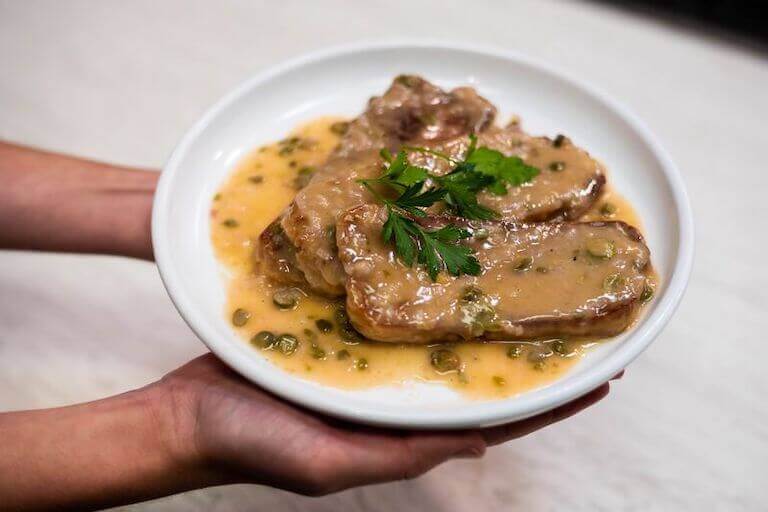
Seitan piccata made in the Plant-Based Culinary Foundations III course
In the Seasonal Plant-Based Cuisine course, students focus on finding and properly preparing in-season produce. They can also explore sustainable practices and the benefits of Farm to Table® cooking.
Even non-vegetarians may be interested in attending a plant-based program. These days, vegetarianism and veganism aren’t the fringe ideologies they once were. In 2022, 14% of US consumers said they followed a meat-free diet, new meat substitutes are hitting the market seemingly every week, and there are multiple Michelin-starred vegan restaurants.
Modern foodies are excited by the prospect of inventive plant-based dishes, and many consider this niche to be the next frontier of culinary exploration. Vegan or not, culinarians can only benefit from a more thorough understanding of how to make plants taste their best.
“You should never be stuck in a rut. People complain that [plant-based cooking] is narrowing your culinary options. But by adopting a more plant-centric diet, you’re forced to be more creative. Investigate new ingredients. It’s an expansion of your culinary capacities to cook plant-based.”*
Shane Witters Hicks, Escoffier Boulder Graduate & Private Chef/Educator, The Soulful Spread
Knowing Your Goals Can Help You Choose the Right Program
So which program is right for you?
Some vegan and vegetarian chefs prefer not to consume animal products, but they are willing to cook these ingredients in order to keep their career opportunities open. And a standard culinary arts program can help provide the well-rounded education that makes it possible to pursue the goal of becoming a chef.
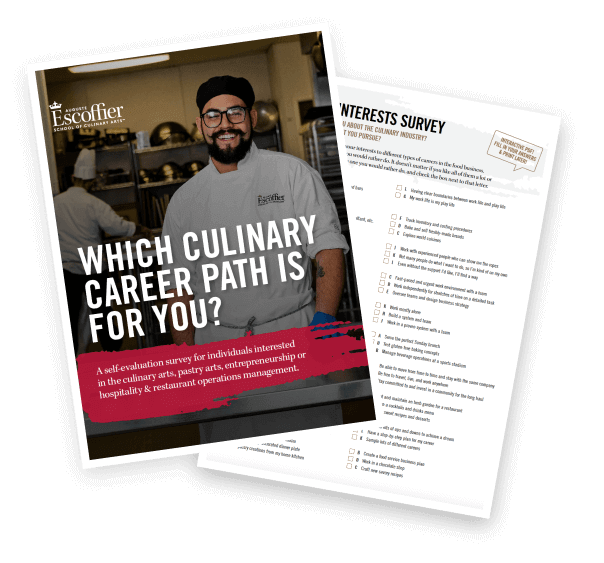
Take the Culinary Career Survey
We’ve compiled a checklist of all of the essential questions into one handy tool: career options, culinary interest surveys, educational opportunities, and more.
On the other hand, if you envision yourself working exclusively in vegetarian restaurants throughout your career, a plant-based culinary program may be the right choice. Or, if you already have the foundations of cooking animal-based proteins down, a plant-based program could help you increase your knowledge of working with ingredients like vegetables, nuts, and legumes.
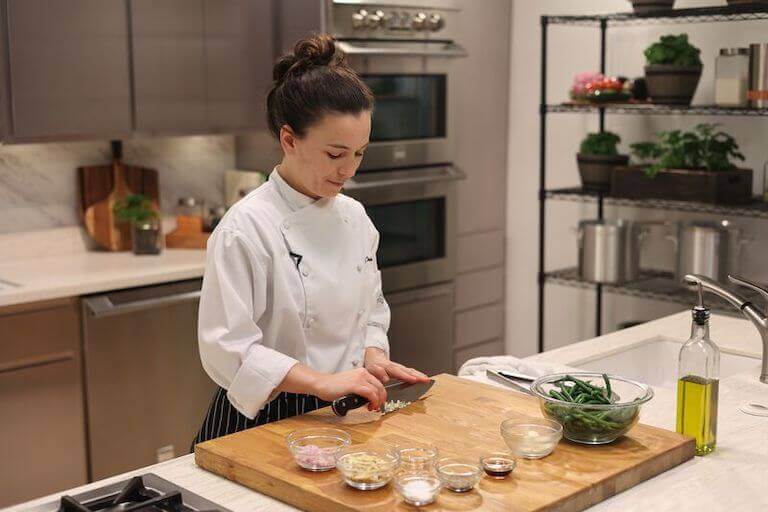
Regardless of the program, Escoffier can introduce students to both the cooking and business sides of the kitchen. Students could complete coursework in Purchasing & Cost Control, Foodservice Management, Entrepreneurship, and more in order to help make them better leaders and managers in the future.
Upon graduation, students may be prepared to jump into their first culinary jobs and start working towards their dreams.
“If you feel you have a passion within this industry, and you really want to pursue that, even if it’s a small niche, take it and run with it. The industry is massive. And there are so many different ways that you can take your career.”*
Stephanie Michalak White, Escoffier Lead Instructor for Plant-Based Culinary Arts Programs
Vegans and Vegetarians Are Welcome
Culinary school is absolutely an option for vegans and vegetarians. Whether you plan to attend a “traditional” culinary arts program or a specialty plant-based program, you can learn a great deal from experienced Chef Instructors and meet like-minded cooks.
Want to compare Escoffier’s Culinary Arts and Plant-Based Culinary Arts programs in more detail? Contact us to learn everything you’ll need to know about these two exciting areas of study.
Explore more resources on the value of a culinary education with these articles:
- What Credentials Do You Need to Become a Plant-Based Chef?
- What Can You Learn in Culinary School?
- How You Can Get Into Culinary School
*Information may not reflect every student’s experience. Results and outcomes may be based on several factors, such as geographical region or previous experience.
This article was originally published on September 1, 2021, and has since been updated.

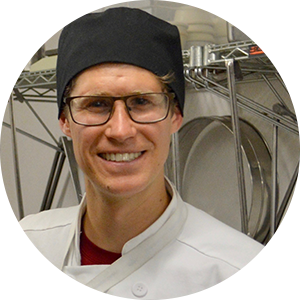 “The more compassion we can have for other people’s way of eating, the better. Going to a traditional culinary school will foster a sense of compassion for how other people like to eat. You’ll only benefit from having that empathy.”*
“The more compassion we can have for other people’s way of eating, the better. Going to a traditional culinary school will foster a sense of compassion for how other people like to eat. You’ll only benefit from having that empathy.”*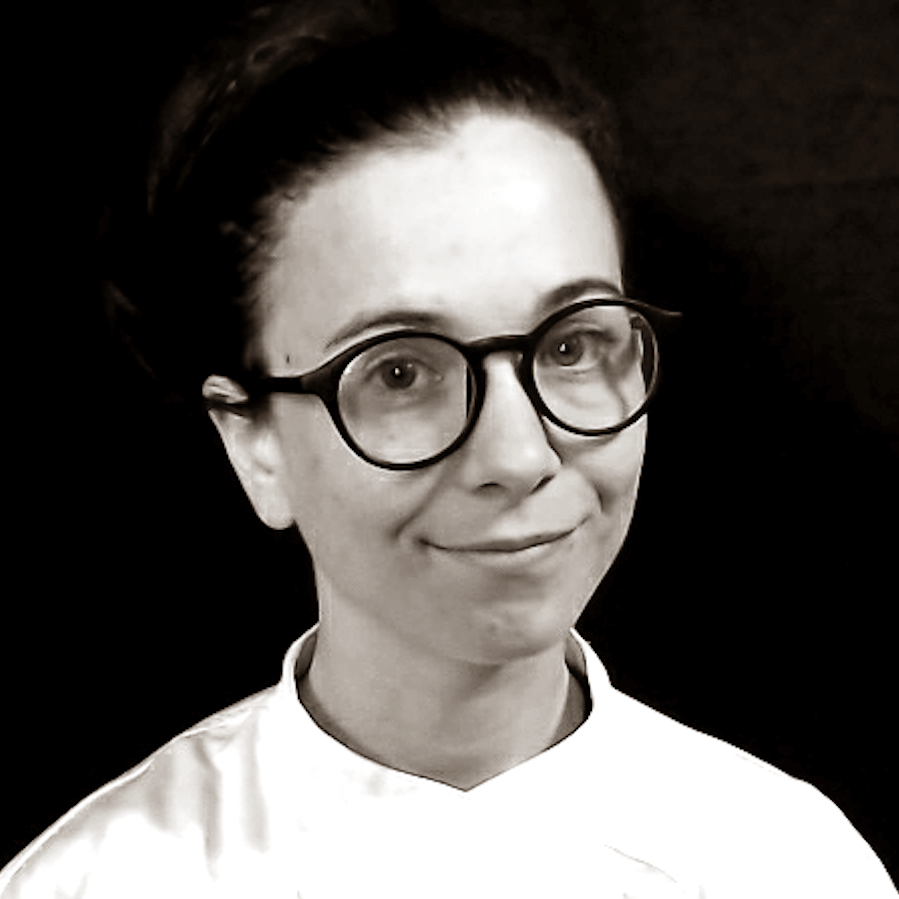 “If you feel you have a passion within this industry, and you really want to pursue that, even if it’s a small niche, take it and run with it. The industry is massive. And there are so many different ways that you can take your career.”*
“If you feel you have a passion within this industry, and you really want to pursue that, even if it’s a small niche, take it and run with it. The industry is massive. And there are so many different ways that you can take your career.”*

